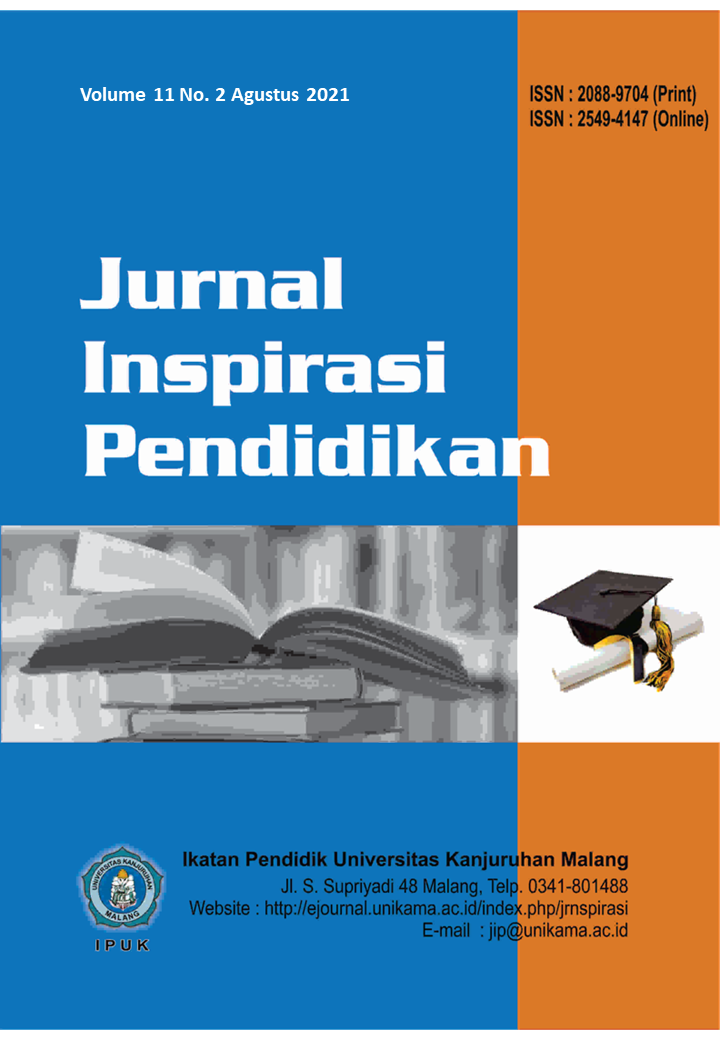Dyscalculia: Mathematical Difficulties in the Concept of Multiplication Using Word Problems
Main Article Content
Abstract
This study aims to analyse the mathematical difficulties that occur in children with dyscalculia cases in the concept of multiplication which focused on the application of word problems. We used qualitative methods by selecting the type of case study research and selecting research instruments in the form of test instruments and interview sheets according to the research flow. The subject of the study was one child in the fourth grade of elementary school who had a case of dyscalculia based on the analysis of doctors and exceptional therapists. The use of random sampling technique to select research subjects in two child development clinics is under the research objectives. The results of the study concluded that subject has difficulty understanding the concept of multiplication, not just a routine procedure, but focus on representing multiplication functionally. In addition, there are other findings that there are difficulties in student recognizing number symbols and connecting numbers with real situations. Therefore, we need special therapy to minimize learning disorders that occur in this student.
Article Details
The journal allows the author(s) to hold the copyright without restrictions.Â
References
Afiati, N. S., & Azwar, S. (2016). Rekonstruksi Alat Skrining Diskalkulia untuk Siswa Sekolah Dasar. Gadjah Mada Journal of Professional Psychology (GamaJPP), 2(1), 1. https://doi.org/10.22146/gamajpp.32312
Amimul, M., & Aquil, I. (2020). Diagnosis Diskalkulia : Tinjauan Komprehensif Diagnosis Diskalkulia : Tinjauan Komprehensif. September.
Azhari, B., Yacoeb, M., & Irfan, A. (2020). Learning for Children with Special Needs of Dyscalculia. Jurnal Ilmiah Peuradeun, 8(3), 475. https://doi.org/10.26811/peuradeun.v8i3.550
Bahadir, E. (2017). Teaching Multiplication and Multiplication Tables By the Application of Finger Multiplication. European Journal of Education Studies, 3(4), 124–147. https://doi.org/10.5281/zenodo.345417
Brendefur, J., Strother, S., Thiede, K., & Appleton, S. (2015). Developing Multiplication Fact Fluency. Advances in Social Sciences Research Journal, 2(8). https://doi.org/10.14738/assrj.28.1396
Chideridou-Mandari, A., Padeliadu, S., Karamatsouki, A., Sandravelis, A., & Karagiannidis, C. (2016). Secondary Mathematics Teachers: What they Know and Don’t Know about Dyscalculia. International Journal of Learning, Teaching and Educational Research, 15(9), 84–98.
Crooks, N. M., & Alibali, M. W. (2014). Defining and measuring conceptual knowledge in mathematics. Developmental Review, 34(4), 344–377. https://doi.org/10.1016/j.dr.2014.10.001
De Castro, M. V., Bissaco, M. A. S., Panccioni, B. M., Rodrigues, S. C. M., & Domingues, A. M. (2014). Effect of a virtual environment on the development of mathematical skills in children with dyscalculia. PLoS ONE, 9(7), 1–16. https://doi.org/10.1371/journal.pone.0103354
Dharma Raja, B. W., & Kumar, S. P. (2012). Findings Of Studies On Dyscalculia � A Synthesis. I-Manager’s Journal on Educational Psychology, 5(3), 41–51. https://doi.org/10.26634/jpsy.5.3.1661
Fernández-Alcántara, M., Correa-Delgado, C., Muñoz, ÃÂ., Salvatierra, M. T., Fuentes-Hélices, T., & Laynez-Rubio, C. (2017). Parenting a Child with a Learning Disability: A Qualitative Approach. International Journal of Disability, Development and Education, 64(5), 526–543. https://doi.org/10.1080/1034912X.2017.1296938
Geary, D. C. (2012). Learning Disabilities and Persistent Low Achievement in Mathematics. J Dev Behav Pediatr., 32(3), 250–263. https://doi.org/10.1097/DBP.0b013e318209edef.Consequences
Emerson, J., & Babtie, P. (2010). The Dyscalculia Assessment. New York: Continum Publishing.
Iuculano, T. (2016). Neurocognitive accounts of developmental dyscalculia and its remediation. In Progress in Brain Research (1st ed., Vol. 227). Elsevier B.V. https://doi.org/10.1016/bs.pbr.2016.04.024
Kaufmann, L., & Von Aster, M. (2012). Diagnostik und intervention bei rechenstörung. Deutsches Arzteblatt International, 109(45), 767–778. https://doi.org/10.3238/arztebl.2012.0767
Khing, B. (2016). Dyscalculia : Its Types , Symptoms , Causal Factors , and Remedial Programmes. Learning Community, 7(3), 217–229. https://doi.org/10.5958/2231-458X.2016.00022.1
Mulyono, B., & Hapizah, H. (2018). Pemahaman Konsep Dalam Pembelajaran Matematika. KALAMATIKA Jurnal Pendidikan Matematika, 3(2), 103–122. https://doi.org/10.22236/kalamatika.vol3no2.2018pp103-122
Mutiani, R., & Suyadi, S. (2020). Diagnosa Diskalkulia Generasi Alpha : Masalah dan Perkembangannya. 4(1), 104–112.
Nfon, N. F., & Ph, D. (2016). Confronting Primary School Pupils in Buea Municipality in the By. 4(4), 437–450.
Pandey, S. (2014). Dyscalculia : A Specific Learning Disability Among Children. May.
Rajaie, H., Allahvirdiyani, K., & Khalili, A. (2011). Effect of teaching attention to the mathematic performance of the students with Dyscalculia in the third and fourth grade of elementary school. 15, 3024–3026. https://doi.org/10.1016/j.sbspro.2011.04.236
Rashid, Y., Rashid, A., & Warraich, M. A. (2019). Case Study Method : A Step-by-Step Guide for Business Researchers. 18, 1–13. https://doi.org/10.1177/1609406919862424
Serrallach, B., Groß, C., Bernhofs, V., & Engelmann, D. (2016). Neural Biomarkers for Dyslexia , ADHD , and ADD in the Auditory Cortex of Children. 10(July), 1–23. https://doi.org/10.3389/fnins.2016.00324
Soares, N., Evans, T., & Patel, D. R. (2018). Specific learning disability in mathematics : a comprehensive review. 7(1), 48–62. https://doi.org/10.21037/tp.2017.08.03
Starman, A. B. (2013). Adrijana Biba Starman The case study as a type of qualitative research. 28–43.
Suharmini, T. (2015). Aspek-Aspek Psikologis Anak Diskalkulia. JPK: Jurnal Pendidikan Khusus, 1(2), 75 - 86.
Szucs, D., & Goswami, U. (2013). Developmental dyscalculia: Fresh perspectives. Trends in Neuroscience and Education, 2(2), 33–37. https://doi.org/10.1016/j.tine.2013.06.004
Zhang, D., Xin, Y. P., & Harris, K. (2015). Improving Multiplication Strategic Development in Children With Math Difficulties. https://doi.org/10.1177/0731948713500146
Zygouris, N., Vlachos, F., Oikonomou, P., & Vavougios, D. (2016). The Implementation of a Web Application for Screening Children with Dyslexia The implementation of a web application for screening children with dyslexia . September. https://doi.org/10.1007/978-3-319-50340-0
Sinaga, R., & Simarmata, E, J. Media Gambar Terhadap Diskalkulia di Sekolah Dasar. Jurnal Tunas Bangsa, 7(2), 219 – 2 34.

